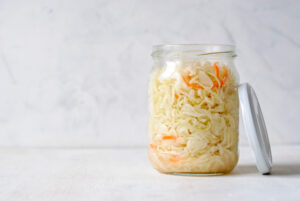HEALTHY FERMENTED FOODS
Which To Eat And Why

Curious about fermented foods, but not exactly sure what to eat or why you should? Fermented foods and beverages, from sauerkraut to your favorite kombucha, carry numerous health benefits — and they’re tasty to boot.
Let’s first unpack the health benefits so you can incorporate them into your diet…
What Are Fermented Foods?
 Food fermentation is a process where microorganisms — like yeast and bacteria — convert starch and carbs into alcohol and acid. The alcohol and acid act as a natural preservative that flavors its contents, giving fermented food their sour flavor profile.
Food fermentation is a process where microorganisms — like yeast and bacteria — convert starch and carbs into alcohol and acid. The alcohol and acid act as a natural preservative that flavors its contents, giving fermented food their sour flavor profile.
Fermentation, as you’re probably aware, is nothing new. In fact, it’s an ancient technique that goes back thousands of years. The process is still used today to make some of your favorite foods, ranging from yogurt and cheese to pickled vegetables.
Fermented foods have been used in TCM for millennia, too. They fall into one of TCM’s five flavors (sour, sweet, bitter, salty, and spicy), each of which has its own associated action and a corresponding organ. Sour flavors are known to have an absorbing or consolidating effect (action), and fermented foods are associated with your liver and gallbladder (organ).
The Importance of Fermented Foods for Your Health
 Fermented foods have been a global sensation for quite awhile. What makes fermented foods so desirable is not so much their complex flavor, but their health benefits.
Fermented foods have been a global sensation for quite awhile. What makes fermented foods so desirable is not so much their complex flavor, but their health benefits.
Specifically, fermented foods are good for your gut. So, what’s the big deal about gut health? Well, Hippocrates, the father of modern medicine, once famously said that, “All diseases begin in the gut.” While he didn’t have it all figured out, he was on to something.
According to Dan Peterson, assistant professor of pathology at the Johns Hopkins University School of Medicine, “A huge proportion of your immune system is actually in your [gastrointestinal] GI tract.”
Your gut acts as a filtration system for your body: As you consume foods, your gut turns away toxins and pathogens and accepts essential nutrients — when it’s in good working order. If your gut is unhealthy, harmful particles get through anyway. This is a condition you may have heard referred to as “leaky gut.”
For your gut to function properly, you have to keep it in check. One way of doing so is by ingesting fermented foods rich in probiotics. Fermented foods restore bacterial colonies in your gut that help it filter out the bad stuff and welcome in the good stuff.
When to Eat Fermented Foods
 Now that we know how crucial fermented foods are for good gut health, should you eat them all the time? Well, you could! However, it’s more beneficial if you know what signs denote bad gut health.
Now that we know how crucial fermented foods are for good gut health, should you eat them all the time? Well, you could! However, it’s more beneficial if you know what signs denote bad gut health.
Here are some typical symptoms and signs that may indicate you have leaky gut syndrome or gut issues:
- Gassiness and bloating
- Unexplainable weight changes
- Food intolerances and allergies
- Chronic fatigue
- Autoimmune diseases
- Hormonal imbalances
- Skin issues (like eczema or psoriasis)
- Brain fog
If you’re experiencing any of these symptoms, you probably shouldn’t switch to consuming nothing but kombucha and kimchi. Rather, experts claim that eating small portions of fermented foods everyday can lead to a healthier gut ecosystem.
That could mean eating a little bit of pickles okra with dinner or taking a shot of kefir in the morning. If you’re not partial to sour foods, though, that may seem like a difficult habit to develop.
No worries — there are tons of fermented foods out there that you can look into. We’ve included a few must-try recipes below so you can get your immune system back into full-working order.
8 Great Examples of Fermented Foods Worth Trying
 1. Kefir
1. Kefir
Kefir is fermented milk that tastes a lot like yogurt. It’s a rich source of nutrients and probiotics, like protein, calcium, vitamin B12, and even magnesium, among others. Usually, it’s made from cow, goat or sheep’s milk, but you can also find alternatives like coconut milk kefir and water kefir.
2. Kombucha
Kombucha is made from fermented black tea and sugar. It contains a colony of bacteria and yeast that kicks off the fermentation process once it’s combined with sugar. Kombucha is a good source of probiotics, and consuming it can even reduce your risk of cancer.
 3. Sauerkraut
3. Sauerkraut
You may associate sauerkraut with Germany, but its roots go back 2,000 years ago, and it’s believed the Chinese were the first to ferment cabbage. Fermented cabbage is packed with nutrients and probiotics, and it’s tasty!
If you’re not into eating it by the spoonful, you can dress it up by adding it as a garnish to potato or leek soup, or by throwing it into a kale and sauerkraut salad (or your favorite superfood salad combo).
4. Miso
Miso just means “fermented beans” in Japanese, and it’s made from fermented soybeans and often other beans like kidney beans and garbanzos. Miso is rich in vitamins and minerals and contains healthy bacteria for your gut. It’s eaten as a paste in certain parts of Asia, but you’ve probably seen it served as a soup before or during a meal at Japanese restaurants.
 5. Tempeh
5. Tempeh
Similar to miso, tempeh is a soy product with tons of nutrients, including high amounts of protein and other crucial vitamins and minerals. But what is it, exactly? After undergoing fermentation, soybeans are pressed into a dense cake, called tempeh.
It’s typically steamed, boiled, sauteed, or even baked, but it can be bland on its own. If you want to try, check out some of these tempeh recipes and see if it’s a food you’d like to incorporate into your diet.
6. Kimchi
Kimchi is a Korean dish that combines and ferments cabbage and an assortment of other vegetables and spices, like ginger, garlic, and pepper. If you’re a fan of kimchi, you can eat small bites of it by the spoonful, or you can mix it into traditional dishes like bibimbap to get more flavor.
 7. Yogurt
7. Yogurt
Similar to kefir, yogurt is just fermented milk. It contains lots of essential vitamins and nutrients, but it’s so commercialized that you’ll want to make sure you’re buying a reputable, healthy brand. Here’s what to look out for:
- Make sure it comes from either sheep or goat milk if you have trouble digesting cow’s milk
- Make sure it comes from grass-fed animals
- Make sure it’s organic
- Whole milk yogurt has fat to protect it from stomach acids so it gets to the gut
- Plain yogurt is best because sugar can make things gassy
The health of the source is just as vital as the product itself, so do your research and find a brand that satisfies these requirements to get the most benefit.
8. Natto
Natto is yet another Japanese fermented staple food made from soybean. Traditionally, soybeans were boiled and then wrapped in rice straw, which contains bacteria that starts the fermentation process.
After fermenting, you’re left with boiled soybeans covered in a sticky substance that smells both sour and nutty. It’s commonly served with soy sauce, mustard, or chives over cooked rice. Like the other fermented foods, natto is rich in nutrients and bacteria that benefit your gut.
Eat, Drink and Be Merry
Fermented foods and drinks are extremely healthy for restoring bacteria in your gut. There’s also tons of recipes and methods out there to diversify the types of foods you’re ingesting.
Experiment by fermenting your own vegetables, or try making your own tempeh one night and serve it with other nutritious foods like edamame or a healthy stir fry. You’ll feel better knowing you tried something new, plus the health benefits are unbeatable!
Got some other fermented food ideas? Throw them into the comments!
Comments (0)
Leave a reply
You must be logged in to post a comment.




